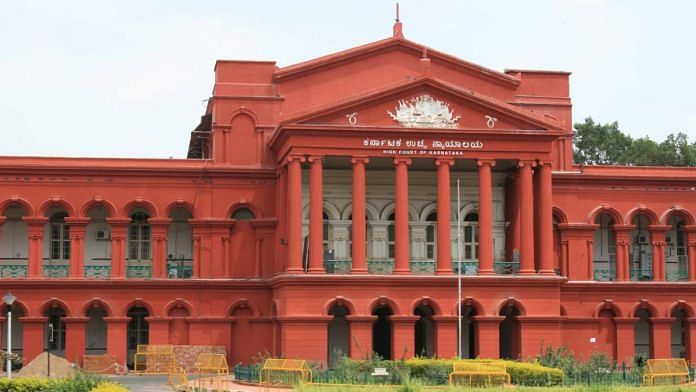
New Delhi: A single-judge bench of the Karnataka High Court Wednesday referred the petitions involving the hijab controversy in the state to a larger bench, and declined to pass any interim orders. The matter is now to be heard by a three-judge bench at 2.30 pm Thursday.
A bench of Justice Krishna S. Dixit had Tuesday commenced hearing a petition filed by a Muslim girl student at Udupi Women’s Pre-University College, challenging her institution’s directive denying entry to her and other students for wearing a hijab or headscarf.
But when the matter came up for hearing Wednesday, Justice Dixit passed an order referring the case to a larger bench.
He noted that the issues raised in the petition gave rise to “constitutional questions” of “seminal importance” with respect to personal law. In view of this, and the judgments cited by the parties in the case, it must be decided by a larger bench, he said.
The judge asked the registry to place the case before the Chief Justice of the Karnataka High Court for consideration, so that it can be marked before an appropriate bench, considering the urgency of the matter.
At the same time, however, Justice Dixit declined to pass any interim orders, despite the petitioners’ lawyers pressing for this. The latter did not oppose the reference to a larger bench, but argued that in the meantime, students should be given some interim relief so that they can attend college and take their final exams.
The reference was, however, opposed by the state’s advocate general, who said the petitions were not maintainable.
Justice Dixit dictated his order after an hour-long hearing Wednesday.
“Having regard to the enormity of questions of importance which are debated, the court is of the considered opinion that the papers be put at the hand of the Chief Justice to decide if a larger bench can be constituted in the subject matter,” he observed in his order.
On the prayers for interim relief, he ordered: “Even interim prayers merit consideration at the hands of a larger bench that may be constituted by the Chief Justice in his discretion, and therefore the arguments advanced on interim prayers are reproduced here. It is open for the petitioners to seek interim relief after a decision is taken by the Chief Justice regarding the constitution of the larger bench.”
Also read: ‘We are losing our friends’, say Udupi Hindu students about Muslim classmates in hijab row
‘Wisdom’ of neighbouring high courts, ‘larger issue’
At the outset of Wednesday’s hearing, the judge had indicated to the counsel his inclination to refer the case to a larger bench.
“I feel this matter requires consideration of a larger bench. The wisdom emanating from neighbouring high court judgments needs to be treated,” he said.
During the previous hearing Tuesday, senior advocate Devadatt Kamat had cited judgments from the Kerala High Court as well as the Madras High Court to assert his point that the hijab was an essential part of Islamic religion. Kamat was criticising a 5 February Karnataka government order that supported, on “public order” grounds, the college’s directive banning the hijab.
The Kerala HC judgment quoted by Kamat had allowed Muslim girl students in hijabs to appear for the CBSE All-Indian Pre-Medical Entrance Test in 2016. He also quoted a Madras HC judgment that observed that while purdah is not essential for Muslim women, headscarves are obligatory.
Counsel appearing for the petitioners agreed with Justice Dixit’s proposition for a reference, but requested interim relief.
Senior advocate Sanjay Hegde, appearing for one of the petitioners, contended that the question involved in the case is whether the state is empowered to prescribe a uniform, and if so, then has it been properly prescribed.
On its part, the state has denied having prescribed any uniform, and told the court that the decision is left to the college committee.
“A teenage girl should not be forced to settle with her conscience for the sake of her education. Let them have the darshan of their teachers,” Hegde urged the judge.
Kamat also asked the court to make “some arrangements for the interim.” He said that Justice Dixit may make the reference, keeping all questions of law open. “However, since the students were going to colleges, let the students study for the next two months,” he submitted.
State Advocate General Prabhuling Navadgi argued against the reference. According to him, the petitions are not maintainable and are misconceived. “Therefore, prima facie, no case is made out,” he said.
The AG argued that the hijab is not an integral part of religious practice, and highlighted a point from the same Kerala HC judgment on which the petitioners are relying in order to assert that a “different view” is always possible.
“The issue has become a larger issue and everybody is looking up to the court for a decision,” the AG said.
Senior advocate Sajan Povayya, who appeared for the College Development Committee, also asked Justice Dixit to render a judgment on the issue as the roster marked to him allows him to deal with the questions raised in the petitions. The counsel added that the prescription of the uniform has been in place for a year, and nobody complained when it was brought in.
At the end of the hearing, a lawyer from the petitioners’ side requested the court to say a few lines for the politicians, just as he did for the students and public Tuesday. But Justice Dixit concluded the proceedings with “Thank you so much,” refusing to make any more verbal remarks.
This report was updated with additional inputs.
(Edited by Rohan Manoj)
Also read: Kundapur PU college allows hijab-wearing students in campus, but no teaching & no classes

COMMENTS